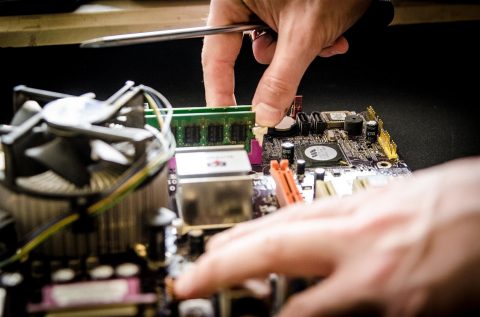Computer Science (BCompSc)
Inside Undergraduate Studies in Computer Science and Software Engineering
Join us for an interactive virtual information session hosted by the Undergraduate Program Director from the Department of Computer Science and Software Engineering.
Why study Computer Science?
Computer science uses theoretical and mathematical foundations of computation to understand both software and hardware structure for effective and creative design.
Our state-of-the-art labs for high-performance computing, networks and artificial intelligence will give you experience with the equipment you’ll use in the field. Through labs, lectures and projects, you’ll also:
- Design and create new software, and modify and test existing software used in a broad range of businesses and industries
- Develop new or improve existing algorithms
- Explore emerging software/hardware technologies
Program highlights
- The student-run Software Engineering and Computer Science Student Society (SCS) organizes coding nights, algorithm practice, tutorials, social events, and networking opportunities.
Special funding for out-of-province students
Up to $4000 for undergraduate programs.
Program structure
A Bachelor of Computer Science degree takes a minimum of three or four years (90 – 120 credits) of full-time study, depending on your academic background.
The core provides a basic and broad study of theory, mathematical basics, programming methodology, computer architecture, data structures, operating systems, and software engineering.
Program options
New students apply for admission to the Bachelor of Computer Science degree. Once you have completed 30 credits, you may apply to the Honours program.
Integrated path
Get a head start on graduate studies. As an undergraduate student in Computer Science, you can take up to 16 credits that count towards both your Bachelor of Computer Science and a Master of Engineering (MEng) in Software Engineering, Information Systems Security, Quality Systems Engineering and Master of Applied Computer Science (MApCompSc).
Courses
Core courses
- Computer science core
- Complementary core
Electives
- Computer science electives
- Mathematics electives
- Minor and general electives
Course sequences
Co-op program
The Co-op program gives you the chance to complete paid work terms that last 12 to 16 weeks. As a Co-op student, you will assist in projects designed and implemented by professionals and may also:
- Develop new or improve existing algorithms
- Participate in software quality assurance, programming, debugging and testing
- Prepare project proposals, specifications and software testing plans
Co-op students have completed work terms for employers such as McKesson Canada and NeuroRx Research.
Admission criteria
Minimum cut-off averages and course requirements for admission
- Quebec CEGEP: 25 overall, 26 math
- Admission is based on applicants’ overall Math CRC indicated above and completion of the following classes as part of their DEC: Calculus 1 and Calculus 2 and Linear Algebra
- Students completing one of the eligible technical DECs may qualify for admission without the listed prerequisites. However, if the prerequisites are taken, a minimum of 26 in math is required.
- Eligible technical DECs include 420.A0/BO/AA
- Advanced standing may be possible
- Additional information for CEGEP applicants
- High School: A- overall, A- math
- One math from Pre-Calculus, Calculus, or equivalent
- Canadian curricula course requirements
- Accepted international qualifications
- ACT or SAT is not required
- AP exams are not required but may qualify you for advanced standing
- International Baccalaureate (IB) diploma: 33 overall, 5 HL or 6 SL math
- one math (Applications and Interpretations HL, Analysis and Approaches HL or Analysis and Approaches SL)
- International Baccalaureate Career-related Programme (CP): 5.5/7 overall, 5 HL or 6 SL math
- one math (Applications and Interpretations HL, Analysis and Approaches HL or Analysis and Approaches SL)
- Additional Career-related Programme (CP) course requirements
- Baccalaureate français: 15 overall, 15 math
- Required courses:
- Première: Spécialité mathématiques
- Terminale: Spécialité mathématiques
- Additional information for Baccalauréat français applicants
- Required courses:
- British system of education (GCE):
- A-levels: At least two A-level exams AB, A in math or
- AS-levels: At least 4 AS-level exams with equivalent results or
- BTEC: Level 3 Diploma or Extended Diploma in a related subject area with equivalent results
- Students without A-level math may be admissible based on AS-level or iGCSE/GCSE/O-Level exam results. Students should include all their exam results from iGCSE (or equivalent) onwards to support their application.
- Additional information for British System of Education (GCE) applicants
- University transfers (internal): 3.0 overall, 3.0 in math, 2.3 in courses offered by the Gina Cody School of Engineering and Computer Science
- At least two of the following (or equivalent): MATH 203, 204, 205
- University transfers (external): B+ overall, A- in math
- Courses in the disciplines of Calculus and Linear Algebra
Minimum cut-off averages should be used as indicators. The cut-off data may change depending on the applicant pool. Applicants who meet the stated minimum requirements are not guaranteed admission to these programs.
Application deadlines

FALL ENTRY (September)
Deadline: March 1
U.S. and international applicants: Apply no later than February 1 to allow time for immigration document processing. However, applying earlier is strongly recommended. Immigration processing times vary by country and delays could prevent you from starting your studies on time.

WINTER ENTRY (January)
Deadline: November 1
U.S. and international applicants: Apply no later than August 1 to allow time for immigration document processing. However, applying earlier is strongly recommended. Immigration processing times vary by country and delays could prevent you from starting your studies on time.
We reserve the right to close admission to a program at any time after the official deadline without prior notice.
Funding note
Quebec residents who enroll in certain programs and meet the eligibility criteria may apply for funding of $2,500 per term through the Quebec Perspective Bursary (Bourse Perspective Quebec).
United States students: A U.S. Federal Student Aid-eligible version of this program is offered. This version meets all U.S. regulations (such as no co-operative education or e-courses) for eligible programs.
After your degree
Given the range of applications in use today, computer science alumni have established careers in a range of sectors including health care, communications, manufacturing, banking, retail, electronics and entertainment.
Student story

Étienne Racine
Bachelor of Computer Science
Computer Games
Minor in Game Design
I’ll be exploring and creating games at TAG, a cluster of the Milieux Institute. Right now, I'm experimenting with machine learning.
Other programs of interest

Stimulate the senses. Engage the mind. When you study computation arts, you become a digital artist, using algorithms and computational theory to create interactive multimedia that breaks new audio-visual ground. Computation Arts is Creative Computing – with a capital C.
Department
Department of Computer Science and Software Engineering
Faculty

Without computer hardware there would be no smart phones, DVD players and digital recorders or computerized medical devices. As a computer engineer, your knowledge of computer architecture, digital electronics, circuits and digital communication will lead to new innovations or bring about another information revolution.
Department
Department of Electrical and Computer Engineering
Faculty

